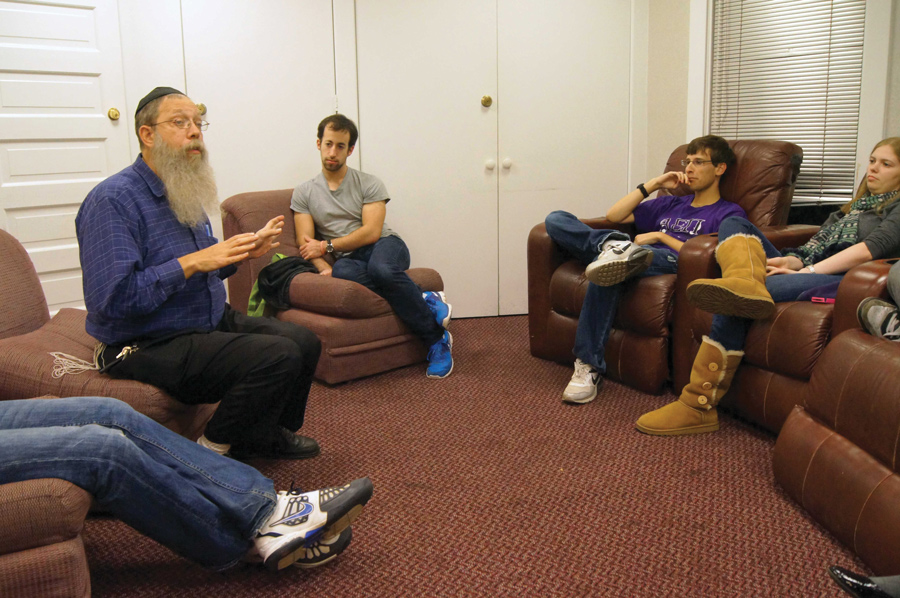Rabbi Dov Hillel Klein becomes a certified Holocaust educator on college campuses, discusses the importance of Holocaust education
Daily file photo by Teal Gordon
Rabbi Dov Hillel Klein. Klein became a certified Holocaust educator on college campuses earlier this year.
February 26, 2020
Rabbi Dov Hillel Klein became a certified Holocaust educator on college campuses after completing a 65-hour training session at Yad Vashem this year, a holocaust museum in Jerusalem.
During the training session, Klein, executive director of the Tannenbaum Chabad House, said he took classes on Holocaust denial, heroism that took place during the Holocaust and photography during the Holocaust, among others. Klein said in many of the photographs from the Holocaust, three groups of people are present: the perpetrators, the victims and the bystanders.
“As an SS officer, at any point, you could have said ‘No, I’m not going to kill Jews,’” Klein said. “And what would’ve been the repercussion? The repercussion, ‘would I have been stripped of my rank? Would I have been detained? Would I myself have been put in prison? Would I myself maybe have been killed?’… And the research shows, nothing (would have been done).”
Klein said one of the courses he took dealt with choices, including those made by the Nazis, the Germans, the Jews and the bystanders. Although the stakes are different, Klein said he feels students must be educated on how to make choices in their daily lives. They make many choices about how to treat others, how to act responsibly and how to deal with racism, Islamophobia, and anti-Semitism.
He said both the knowledge of the facts of the Holocaust as well as an education about the philosophies of the consequences of choices made in daily life are important to understand. In terms of anti-Semitism at Northwestern, Klein said, he has seen fewer incidents this year than in the past, but that educating the community on issues like anti-Semitism and racism are always crucial.
In addition, Klein said he believes it is important for the Jewish community and others, such as the African-American, Latinx and Muslim communities, to learn about one another and about their cultures and their different experiences with marginalization.
Sarah Cushman has been the director of the Holocaust Educational Foundation at Northwestern since 2016. HEF has programs at the global, national and local levels that revolve around the discussion of Holocaust education. At Northwestern, there is also a four-course certificate of achievement in Holocaust studies.
Cushman said Holocaust education at the university level is important because although many students have had some education at the middle and high school levels, they may not all be mature enough to engage deeply with the topic until college.
“Much of it is sort of individually wrestling with the ways that democracy can be undermined, the ease with which democracy can be undermined, the powerful role of self-interest in how we engage with other people,” she said. “These are all really complex issues, and this particular moment in history gives us a lot to think about both emotionally and intellectually.”
Prof. Benjamin Frommer has taught several courses on the Holocaust, including the History of the Holocaust for the past five years.
Frommer said the intensity and longevity of a college course means students have the requisite time to grapple with concepts over the course of a full quarter.
“(Museums are) really important to introduce people to general ideas, but in a two hour visit, you really can’t grapple with important questions and have feedback and responses that allow you to realize the complexity of the situation,” he said.
Frommer agreed with Klein that there are lessons to be learned from the Holocaust outside of just learning the historical facts.
He said the extreme circumstances of the Holocaust allow scholars to examine human nature in a unique way.
“Not just the Holocaust, but the war more generally, presents a situation where people were facing questions of life and death and decisions which were, in many cases, choices between something horrible and something even worse,” Frommer said. “Therefore, it allows us to understand aspects of human nature and human relationships that are not necessarily so clear in daily life ,where people are surrounded by their normal environments.”
Email: ariannacarpati2023@u.northwestern.edu
Twitter: @ariannacarpati1
Related Stories:
–History Prof. Daniel Greene curates exhibit for Holocaust Museum



